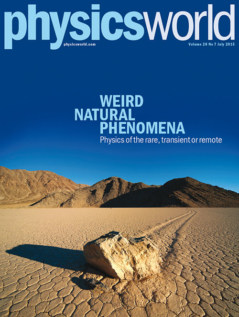Sometimes, nature does something unexpected – something so rare, transient or remote that only a lucky few of us get to see it in our lifetimes. In the July issue of Physics World, we reveal the physics behind our pick of the weirdest natural phenomena on our planet, from dramatic rogue waves up to 30 m tall, to volcanic lightning that can be heard “whistling” from the other side of the world, and even giant stones that move while no-one is watching. We also tackle tidal bores on rivers and the odd “green flash” that is sometimes seen at sunset.
Plus, we’ve got six fabulous full-page images of a range of weird phenomena, including salt-flat mirrors, firenadoes, “ice towers”, beautifully coloured nacreous clouds, mysterious ice bubbles of gas trapped in columns, as well as my favourite – the delicately wonderful “frost flowers” seen very occasionally on plants.
If you’re a member of the Institute of Physics (IOP), you can get immediate access to this special issue with the digital edition of the magazine on your desktop via MyIOP.org or on any iOS or Android smartphone or tablet via the Physics World app, available from the App Store and Google Play. If you’re not yet in the IOP, you can join as an IOPimember for just £15, €20 or $25 a year to get full digital access to Physics World.

For the record, here’s a rundown of what else is in the issue.
• CERN enters new territory – CERN’s Large Hadron Collider has collided protons at 13 TeV, opening up a new energy regime in the search for particles beyond the Standard Model, as Michael Banks reports
• TV show converts funny into funding – Nick Thomas reports on how the creators of TV’s The Big Bang Theory will be funding real physics students in the US
• Harnessing the crowd – As governments scale back investment in basic science, Travis Metcalfe calls on scientists to tap other avenues of funding for their research
• Lab lit revealed – Robert P Crease talks to the founder of LabLit.com, a website devoted to literature about laboratories
• The restless rocks of Racetrack Playa – Tucked away in California’s Death Valley National Park, the flat basin known as Racetrack Playa is littered with stones that seem to migrate across the landscape. But how do they do it? Brian Jackson describes how he and collaborators Ralph Lorenz and Richard Norris solved a long-standing mystery
• The green flash – Sunrise and sunset can be spectacular – the result of a beautiful interaction between the light from our nearest star and the Earth’s atmosphere. But for Pete Lawrence, a phenomenon connected with these events holds even more appeal – the elusive “green flash”
• Whistling volcanoes – Triggered by lightning in thunderstorms, whistler waves are radio waves that are channelled thousands of kilometres around the world via ducts in the magnetosphere. As Ian Randall reports, these mysterious waves have now been shown to come from volcanic lightning, too
• Going rogue – Once thought to be the stuff of exaggeration by seafaring folk, we now know that giant “rogue” waves that soar to heights of up to 30 m really do occur at sea. But scientists can’t yet agree on why they happen, as Philip Ball reports
• Chasing the Silver Dragon – Occurring on only a few dozen rivers around the world, tidal bores are as rare as they are intriguing. Michael Berry outlines the science behind this natural phenomenon and describes his sighting in China of one of the most spectacular bores of them all
• A quest for ultimate reality – Melanie Windridge reviews Trespassing on Einstein’s Lawn: a Father, a Daughter, the Meaning of Nothing and the Beginning of Everything by Amanda Gefter
• Room at the bottom – Paul Michael Grant reviews Moore’s Law: the Life of Gordon Moore, Silicon Valley’s Quiet Revolutionary by Arnold Thackray and David C Brock
• Joining the nuclear renaissance – A year after earning her degree in physics, nuclear newbie Kate Wright shares her experiences of starting out in an industry that is enjoying a revival in the UK
• Once a physicist: Ben Miller – How the British comedian rose to stardom
• T is for twister – Margaret Harris looks at the power and danger of tornadoes



